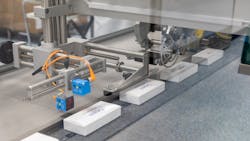Regeneron hit with CRL following FDA inspection of Catalent site acquired by Novo Nordisk
Regulatory decisions for Regeneron’s pending FDA applications for blood cancer therapy odronextamab and eye disease drug Eylea HD will be delayed following the agency’s inspection of a former Catalent manufacturing site in Bloomington, Indiana, which was recently acquired by Novo Nordisk.
The problems were uncovered during an FDA inspection last month at Novo Nordisk’s Bloomington facility, a fill-finish site for Regeneron’s Eylea HD and odronextamab which handles the final stages of drug preparation and packaging.
Regeneron announced on Friday as part of its second-quarter 2025 financial results that the FDA on July 30 issued a Complete Response Letter (CRL) for its application for odronextamab, a bispecific antibody targeting CD20 and CD3 in relapsed/refractory follicular lymphoma after two or more lines of systemic therapy.
The company also said it now expects regulatory decisions to be delayed for its currently pending FDA applications for Eylea HD — pre-filled syringe, every-four-week dosing and for the treatment of macular edema following retinal vein occlusion — which have PDUFA dates this month.
“The anticipated delay is related to observations from an FDA general site inspection at the filler for Eylea HD in these regulatory applications, Catalent Indiana LLC (recently acquired by Novo Nordisk A/S),” stated Regeneron’s announcement, which noted that the inspection was completed in mid-July and was not specific to Eylea HD.
Regeneron said that Novo Nordisk has been in communication with the FDA and expects to submit its response this week. Based on Regeneron’s review of the agency’s observations and Novo Nordisk’s proposed response to the regulator, as well as the progress Regeneron has made with alternate third-party fillers, an “expeditious resolution of the filling issues” for Eylea HD is expected, according to the announcement.
Regeneron CEO Leonard Schleifer said during Friday’s earning call that the FDA’s observations at the Bloomington site were not related to major structural issues.
“It’s not like they [Novo Nordisk] have to rebuild something — they’re mainly process-procedural, those sorts of things,” Schleifer told analysts. “We do think that they’ll provide a robust response. Novo’s CEO wrote directly to the FDA and said they’re gonna elevate all this to the standards of Novo.”
Schleifer added that Regeneron “may not be the only due for this ensnare” as Novo Nordisk does work for “virtually all the biopharmaceutical companies” and Catalent filled in its fiscal year 2024 “something like 70 or 80 billion-unit doses, so I think that this has a good chance of being done expeditiously.”
In December 2024, Novo Nordisk announced that the $16.5 billion acquisition of Catalent by Novo Holdings and the related $11 billion acquisition by the Danish drugmaker of three manufacturing sites from Novo Holdings was completed.
Located in Bloomington, Anagni, Italy, and Brussels, Belgium, the three sites are meant to boost the production of Novo Nordisk’s wildly popular blockbuster GLP-1 medications Ozempic for type 2 diabetes and Wegovy for obesity.
Last month, Italy’s government appointed a special commissioner to accelerate upgrades to the fill-finish facility in Anagni, as part of Novo Nordisk’s $2.3 billion investment in the factory formerly owned by Catalent.
About the Author
Greg Slabodkin
Editor in Chief
As Editor in Chief, Greg oversees all aspects of planning, managing and producing the content for Pharma Manufacturing’s print magazines, website, digital products, and in-person events, as well as the daily operations of its editorial team.
For more than 20 years, Greg has covered the healthcare, life sciences, and medical device industries for several trade publications. He is the recipient of a Post-Newsweek Business Information Editorial Excellence Award for his news reporting and a Gold Award for Best Case Study from the American Society of Healthcare Publication Editors. In addition, Greg is a Healthcare Fellow from the Society for Advancing Business Editing and Writing.
When not covering the pharma manufacturing industry, he is an avid Buffalo Bills football fan, likes to kayak and plays guitar.
